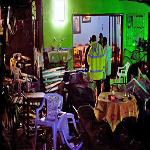16 July 2010

Photo: AFP
Ugandan police inspect the destroyed Ethiopian Village restaurant in Kampala after twin bomb blasts tore through crowds of football fans, killing 64 people, 11 Jul 2010
A crowd of about 100 mourners gathered at Kampala's tiny Ethiopian Orthodox church Friday to remember 32-year-old Getayewakal Tessema, the only Ethiopian killed in the Kampala terror blasts.
Eritreans in the Ugandan capital held a similar service for six members of their community who also died in the attack on an Ethiopian restaurant, where fans were watching the World Cup soccer final.
The bodies were later taken to Entebbe airport for shipment home.
Members of the small Eritrean and Ethiopian expatriate communities expressed thanks to the Ugandan government for its help in returning the bodies and for the security provided in the hours immediately after the bombings, when anti-foreigner sentiments briefly flared in Kampala.
But the representative for Ethiopian refugees in Kampala, Aman Abile Dure, says Ugandans' normally hospitable attitude toward outsiders changed abruptly when Somali insurgents took responsibility for the bombs, and word spread that police had arrested several foreigners.
"Sometimes when you lost something, you may suspect everything," said Aman. "Because Uganda has not been used to such a problem. And then when someone is taking responsibility of such things they may suspect, but not all Ugandans. Ugandans are good people for us."
Aman says the World Cup bomb attacks put Ethiopians in Uganda in an peculiar situation. On one hand, the Ethiopian restaurant appears to have been hit because of Ethiopia's deep involvement in Somalia's war in support of the western-backed transitional government.
On the other hand, the bombings led many Ugandans to see Ethiopians and others from the Horn of Africa as the source of their troubles.
Immediately after the bombings, Ugandan opposition leader Kizza Besigye described the position of Ethiopians as "a double edge".
"I have heard many reports so far that anybody who looks like a Somali is being attacked," he said. "And unfortunately some of those people are being attacked [are] Ethiopians who are on the other [side of the] fence of the struggle."
Ethiopians and others with lighter skin and thin features, normally associated with the Horn of Africa, say they have been staying off the streets of Kampala in recent days. Ethiopian community leader Banteyehu Haile says it is regrettable but understandable given the fear that raced through Kampala when people realized they were being targeted by Somali insurgents.
"It's very sad," he said. "Uganda is a very nice country. People are hospitable. We had enjoyed everything to date, but suddenly this thing happens. So it's really very depressed.
As days go by, Ugandan tempers are clearly cooling. Attacks against foreigners have stopped.
Ethiopian community leaders Friday reported what could be good news. They were called to the Ugandan prime minister's office and asked to produce documents about four Ethiopians held in connection with the bombing case. A community spokesman said the tone of the conversation indicated the four could be released within days.